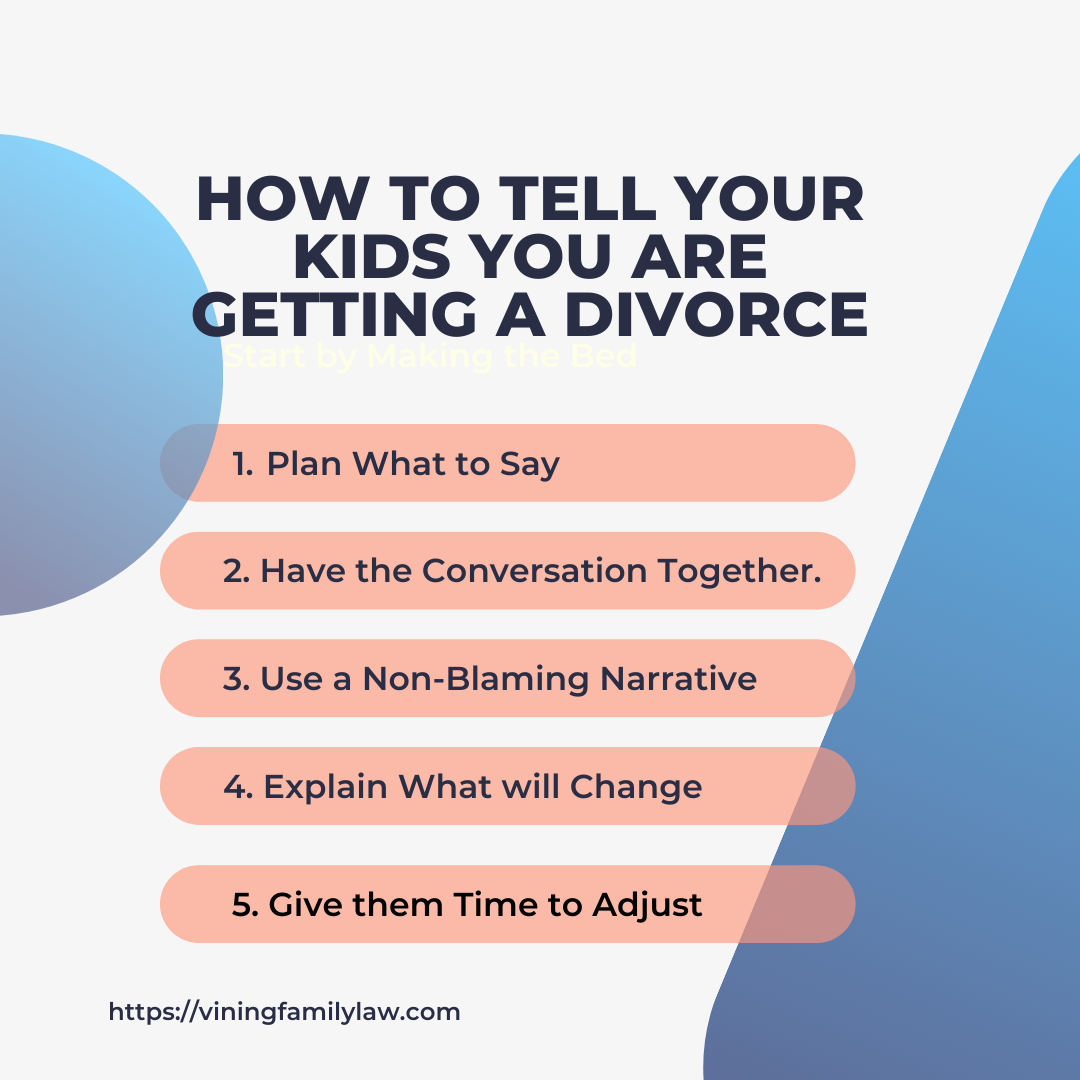How to Tell Your Kids About Divorce: A Guide for Parents
Telling your children about your divorce is one of the most difficult conversations you will have. While divorce is a life-changing event for the entire family, how you break the news can shape how your child processes and adjusts to this transition.
As an Indiana family law attorney, I have helped many parents navigate child custody and co-parenting arrangements. Here’s a compassionate, structured approach to telling your children about divorce in a way that minimizes confusion and emotional distress.
1. Plan What to Say Before the Conversation
Before sitting down with your child, take time to carefully plan how you will deliver the news.
✔ Decide on the Message – What do you want your child to understand? The goal is to explain that while your relationship as a couple is ending, your role as parents remains unchanged.
✔ Keep It Simple & Age-Appropriate – Younger children need basic explanations, while older kids may require more details. Avoid legal or financial discussions that could overwhelm them.
✔ Prepare for Their Questions – Kids will naturally ask, “Where will I live?” or “Do you still love me?” Be ready to offer reassurance and clear answers.
💡 Example: Instead of saying, “We don’t love each other anymore,” say, “We have decided to live separately, but we both love you very much.”
2. Present a Unified, Non-Blaming Message
Ideally, both parents should sit down together to talk with the child. Even if you and your spouse don’t see eye to eye, presenting a united front helps prevent confusion and unnecessary stress.
✔ Avoid Blame – Do not point fingers or discuss personal conflicts.
✔ Reassure Them – Make it clear that the divorce is not their fault and that both parents will continue to be involved.
✔ Focus on Stability – Explain that while some things will change, your love for them will always remain the same.
🚨 What NOT to Say:
“Your mom/dad is leaving us.”
“If they hadn’t done [something], we wouldn’t be getting divorced.”
✅ What TO Say:
“This is a decision we made together, and we will always be here for you.”
“Even though we won’t live together, we will still be your parents forever.”
3. Explain What Will Stay the Same and What Will Change
Children thrive on routine and predictability. While divorce brings changes, reinforcing what will remain the same can help them feel secure.
✔ Will they stay in the same home or school?
✔ What will the new parenting schedule look like?
✔ What traditions and routines will continue?
💡 Tip: If you don’t have all the answers yet, be honest. Let them know you will keep them informed as plans are made.
✅ Example: “You will still see both of us regularly. We are working on a schedule to make sure you have time with both parents.”
4. Give Your Child Time to Process the News
Telling your child about divorce is not a one-time conversation. They will need time to adjust, and their emotions may evolve over time.
✔ Choose a Low-Stress Time – Avoid telling them right before school, bedtime, or important events.
✔ Let Them Express Feelings – Be patient if they react with sadness, anger, or confusion.
✔ Encourage Open Communication – Let them know they can always ask questions and talk about their feelings.
💡 Tip: Some children may not react right away. Be patient and check in with them as they process the change.
✅ Example: “I know this is a lot to take in. You might have questions later, and that’s okay. We’re here to talk anytime.”
5. Reassure Them That They Are Still Loved
One of the biggest fears children have during divorce is that they will lose one or both parents. Reassure them that no matter what changes, they are loved and supported.
✔ Tell them you love them often.
✔ Spend quality time together.
✔ Avoid making them feel like they have to choose between parents.
💡 Example: “Even though we won’t live in the same house, we will both always love you and be here for you.”
6. Use Books to Help Children Understand Divorce
Books are a great way to help children process their emotions in a non-threatening way. Reading together can encourage open discussions and provide reassurance.
📚 Recommended Books About Divorce for Kids:
✔ What in the World Do You Do When Your Parents Divorce? A Survival Guide for Kids
✔ Two Homes
✔Dinosaurs Divorce
💡 Tip: Let your child pick a book that interests them. Reading together can help them feel understood and less alone.
Final Thoughts: Helping Your Child Through Divorce
Divorce is a major transition for children, but how you handle the conversation can shape their emotional adjustment. By planning ahead, focusing on reassurance, and keeping communication open, you can help them navigate this change with confidence and security.
If you have questions about child custody, parenting time, or co-parenting arrangements, I’m here to help.
📞 Call Vining Legal at (317) 759-3225 or
🔗 Schedule a Free Consultation
Your child’s emotional well-being matters—get the legal support you need today. 🚀

